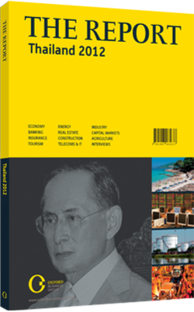Rebalancing wealth: The impact of the rise in the minimum wage
One of the most important changes to the Thai economy expected for 2012 came on April 1, when the minimum wage in Bangkok and six other of Thailand’s 75 provinces was boosted from about BT220 ($7) to BT300 ($9.60) – a 36% jump. The wage hike will be applied to all provinces in January 2013, and will fulfil one of the current government’s major campaign promises. There are concerns about triggering inflation, the ability of small and medium-sized enterprises (SMEs) to cope, and questions about implementation, but overall Thailand’s economic brass – both public and private – seem united on the need to make the move.
A BOOST TO PURCHASING POWER: Prime Minister Yingluck Shinawatra’s Pheu Thai party won a parliamentary majority in July 2011 on a populist platform, including agricultural subsidies, dropping corporate taxes to enhance competition, and boosting the minimum wage. The lowest amount paid to workers in the informal economy has varied in Thailand, ranging from about BT220 ($7) a day in the most economically advanced areas, such as Bangkok and the resort island of Phuket, to BT159 ($5.10) in the northern provinces, which are economically less developed. A main motivation for this unequal scale has been to encourage the spread of manufacturing jobs beyond Bangkok by offering a lower labour cost. Workers have been getting cost-of-living adjustments in recent years, but this large hike is intended to be a rebalancing of wealth. It is also in part an attempt to make domestic purchasing power a greater factor in the Thai economy, which has been exposed to the global economy in recent years to the extent that the current government has pledged to reduce the reliance on exports.
As of late March, the announced plan was to boost the lower-paid areas to BT220 ($7) in 2012, and then to BT300 ($9.60) by 2013, creating parity across all provinces. At that point the minimum wage would be frozen until 2015, and would represent an average raise of 40% for those Thais impacted. This timetable, which was announced in October 2011, is a negotiated solution between employers, government and organised labour. The latter party had been pushing for an immediate increase to BT300 ($9.60) for all workers.
INVESTOR CONCERNS: Though some economists feared a drop in foreign investment as a result, and an additional challenge for industrial concerns already reeling from flood impacts, most of the concern expressed has been about the speed of the hikes. A study by the Thailand Development Research Institute found that one early consequence may be a reluctance to hire in the formal economy, and an overall pushing of workers into the informal sector. “Empirical evidence using historical data indicates that the impact on employment and labour movement into the informal sector could be substantial,” the think tank said in a recent report.
Despite official projections of a minimal impact, in some labour-intensive industries such as textiles, producers have moved to borders areas near Myanmar and Cambodia to take advantage of cheaper migrant workers available there. Some companies even construct their factories in these neighbouring countries.
INCREASING COSTS: SMEs in particular are considered at risk of being unable to handle the additional costs, though a number of measures to help small businesses have been discussed, including loans, tax exemptions and portfolio guarantee schemes, among others.
Inflation is also a concern whenever millions of people get a large raise. In addition to the minimum-wage hike, government workers may also see a boost in incomes from a plan to ensure that those civil servants with a post-graduate degree are paid BT15,000 ($479) monthly at minimum. This is intended to close the gap between salaries for government work and salaries in the private sector, in hopes of attracting talented people. These changes, combined with a stabilising outlook for the global economy – and in particular for European countries, historically among the top purchasers of Thai exports – are setting the stage for a consumption-driven boost to the economy and a drop in the inflationary pressure that often accompanies it.
You have reached the limit of premium articles you can view for free.
Choose from the options below to purchase print or digital editions of our Reports. You can also purchase a website subscription giving you unlimited access to all of our Reports online for 12 months.
If you have already purchased this Report or have a website subscription, please login to continue.

